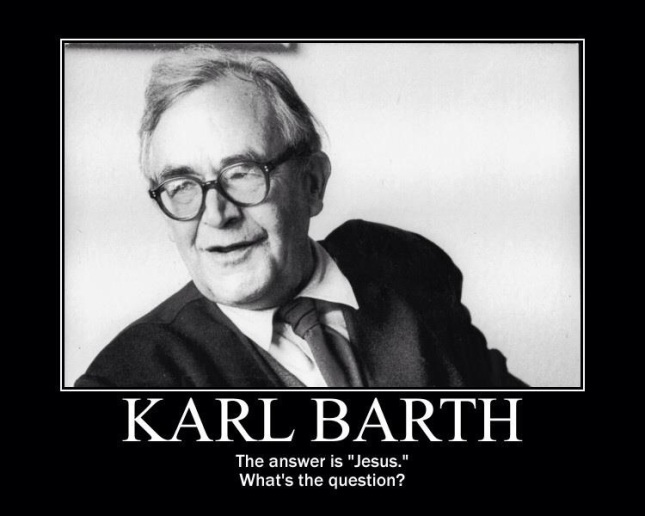
.
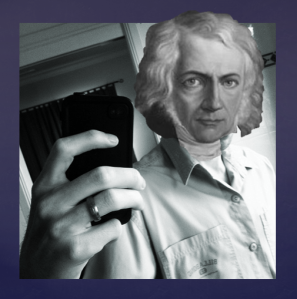
In 1950 [Francis] Schaeffer visited the renowned theologian {Karl Barth] at his home in Switzerland. There he asked [him], “Did God create the world?” Barth answered, “God created the world in the first century a.d.” Francis gestured out the window to the forested hillside and asked, “This world?” Barth replied, “This world does not matter.” — Michael Hamilton
It is easy to see how the comments from Karl Barth above also could relate to how one views the matter of history. Matthew Becker, theologian at Valparaiso University, addresses this a bit more when he speaks about the significance of the 19th century father of Erlangen theology Johann von Hofmann:
“As the principal figure in the Erlangen theological tradition, Hofmann’s significance resides in his response to what is perhaps the premiere question of modern Christian theology: What is the proper relation of Christian faith and experience to historical knowledge? On the one hand, as a post-Enlightenment theologian, Hofmann struggled to interpret an historically-oriented faith in response to the nature of history and the critical methods used by historians when they conduct historical investigation. On the other hand, as a post-Enlightenment theologian of faith, Hofmann was concerned to define the nature and basis of Christian faith itself. How, if at all, are God, personal faith, and history related?
As I noted in a recent post, contra Hofmann’s approach, theology must not aim to build itself on the individual Christian’s relationship with God.* (also see this post). This goes for talking about these things in a more abstract or a more personal (experiential) way. On the contrary, the essence of Lutheran theology – Christian theology! – is the utterly justifying and life-transforming good news of Jesus’ life, death, and resurrection for the whole fallen world – each individual person included . Period! Always going hand in hand with this is the fearless proclamation of the same, enacted by the sending of those who serve as faithful stewards of the mysteries of God.
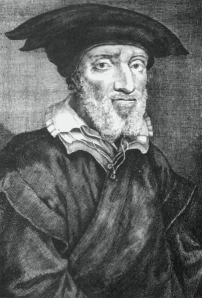
Further, Lutheran theology has, like the Apostle Paul, always been keen to point out the critical nature of the historical component of Christian faith** (see the end of this post for a bit more on this). For instance, the courageous Lutheran reformer Matthias Flacius’ (see here) personal motto was in fact “Historia est fundamentum doctrinae” or “History is the foundation of doctrine”.***
But were the great Lutheran theologians after Luther, Flacius, and Chemnitz (or any other great theologians for that matter) as focused on this point? Perhaps not. Not long ago Lutheran theologian David Scaer, writing a reflection piece**** on the late Robert Preus, had some very interesting things to say about his former colleague’s theology of Scripture vis a vis history:
“For Preus, the Bible’s christological character is determined by the Word that exists alongside of God without referring to it as the incarnate Word and so the historical aspects of Jesus’ ministry are not included in the Spirit’s inspiration of the Scriptures…. In defining the inspiration of the Scriptures… the Lutheran dogmaticians and Preus held to a direct working of the Spirit on the writers and went further to say that Christ as God’s eternal Word was speaking in the Scriptures, but they did not take the next step in identifying the Word with the historical Jesus. In inspiring the Scriptures, the Spirit worked directly without means. Christ, assumably the Jesus of the Gospels, was the content of the Scriptures but was not part of the process of inspiration… “

More:
“For the dogmaticians, the unity of the Scriptures was derived from common inspiration by the Spirit and not by their historical, organic interconnectedness.” (p. 83)*****
In footnotes Scaer quotes Preus himself talking about this very issue:
“The Lutheran theologians refuse to debate how Christ is present in the Word of Scripture and how Scripture brings Christ to us.” (Preus, The Theology of Post-Reformation Lutheranism, 374, quoted in Scaer, p. 87)… Scaer goes on to write in footnote 55: Preus said Christ’s presence in the Scriptures was a mystery and any probing of this was philosophizing (The Theology of Post-Reformation Lutheranism, 377). Not really.”
And later in his article Scaer says:
Preus… approaches biblical history from inspiration and not from a historical perspective, as has been recently done by Simon Gathercole,N.T. Wright,and Larry Hurtado.His approach is ahistorical. Inspiration is the proof of an event’s historical character. Just as historical circumstances of the biblical writers have no part in defining inspiration, so the historical events reported in the Scriptures are to be accepted because they have been recorded by inspiration. (p. 84)
Scaer explains more in footnote when he says:
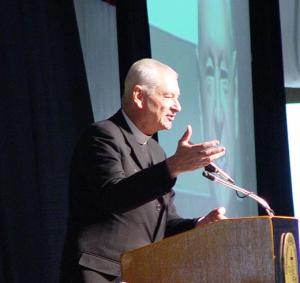
“In his essay “The ‘Realist Principle’ of Theology,” in Doctrine is Life: Essays on Justification and the Lutheran Confessions, ed. Klemet I. Preus (St. Louis: Concordia Publishing House, 2006), 367-373, Kurt Marquart analyzes what he calls Preus’s “realist principle” or “biblical realism” as set forth in “How Is the Lutheran Church to interpret and Use the Old and New Testaments?” Lutheran Synod Quarterly 14 (Fall 1973): 31-32. While Marquart says that the lecture was given at Bethany Lectures in 1973, it is more likely that it was given the year before in 1972. In this lecture biblical realism includes not only the biblical history but doctrines like justification. In this essay Preus insisted “that history and reality underlay the theology of Scripture” (367), and “he specified ‘biblical realism,’ a presupposition for biblical interpretation” (368). Beneath the historical underlay, however, was inspiration.” (footnote 30 on page 84)
While overall Scaer’s critique of Preus looks to be rather powerful and important, it seems to me that this may not be quite the either-or issue he appears to be making it out to be, and I wonder if some form of reconciliation of views here is possible (even as, from Scaer’s perspective, this may be seen as being unnecessary******). How might Preus’ “from above” way of doing theology and Scaer’s “from below” way of doing theology be synthesized in some way – such that a stronger overall theological approach is the result? I think that there is a lot of fruitful discussion to be had in this area, and I hope to start exploring these ideas more myself in a future series.
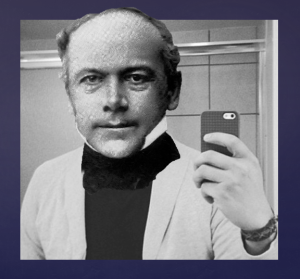
To wrap things up: even with all that has been said above, I have no reason to believe that both of these men would not strongly agree on the unique authority of the Scriptures, echoed in what Robert Preus wrote concerning the 17th century Lutheran John Gerhard:
“Every decision in doctrinal controversy must be sought from Scripture, and in this sense Scripture is a judge. Scripture acts as a judge in a threefold manner: first, as a touchstone which directs the Church so that she can render infallible judgment in so far as she abides by Scripture; second, as the voice of the supreme judge who settles all problems in doubt in religion ; and third, as that which influences the heart to accept the teaching of Scripture. In divine matters Scripture acts as plaintiff, witness and judge.” (Preus, speaking about Gerhard in the Inspiration of Scripture, 2003 ed., p. 120)*******
More on these issues in upcoming posts.
FIN
Notes:
* Johan von Hofmann thought that theology is about “God and the soul” (which some say is the basis of Augustine’s theology) or “God and the sinner who is justified by God.” (something Luther said about theology at one point). It is true that we can say, to some degree, that theology is never only about “God.” Further, when it comes to interpreting the Scriptures and sizing up the work of God in history through his church, theologians (something we all are in a wide sense) are “never able to escape our shadows”. That said, that is exactly what we should try to do: we first and foremost focus on God and because God focuses on us sinners, we also talk about us as *He* talks about us. Therefore, it is indeed inevitable that a limited amount of talk regarding ourselves that is going to happen. And yet, here we find that if there is any human being that we should begin to focus on more and more besides the God-man, it is our neighbor, as we are continuously reminded and even inspired, in our heart of hearts with Christ, to consider others better than ourselves. In short, as we mature more and more we are always actually looking outside of our individual selves more and more – to God in faith and our neighbor in love.
** Many passages could be noted here, but I believe there is great significance in the following in particular: “If I have told you earthly things and you do not believe, how can you believe if I tell you heavenly things?” (John 3:12). “ But it is not the spiritual that is first but the natural, and then the spiritual.” (I Cor. 15:46). “And if Christ has not been raised, then our preaching is in vain and your faith is in vain” (I Cor. 15:14).
*** Going along with this, we can say that the Christian faith, for all practical purposes, has “timeless” or perhaps better, permanent teachings (speaking more literally, a truly timeless on would be that God is Triune and love). God created the world. Man fell. God redeemed the world in Christ. The Decalogue. Jesus is the first and the last, the beginning and the end, the one who has come and who will come again, etc. etc.
Some insist that in the name of articulating the “living reality” of Christian faith and an “organic-historical view” of the same, irrelevant and “dead letter” dogmas such as these must be put in a fresh theological frame and perhaps even transformed. This, of course, is nonsense. There is nothing about these doctrines that is dead. In his Theology of Post-Reformation Lutheranism: a Study of Theological Prolegomena, Robert Preus tells us:
“Historic Lutheranism definitely did not make revelation a mere matter of ‘communicating a body of knowledge,’ as has been sometimes attributed to all of 17th-century theology indiscriminately. According to Calov, ‘Revelation is an action of God {actus Dei externus} whereby He disclosed Himself {sese patefecit} to our human race through His Word {per verbum suum}, thereby bringing us to a saving knowledge of Him {ad salutarem ejusdem informationem}.” (p. 184, quoted in Press, “Missio Dei: Transforming Center of Scripture”, Missional Transformation: God’s Spirit at Work, pp. 156-157)
We do not submit these things above to a more Hegelian approach towards history (yes, I know in order to be intellectually respectable in today’s theological world one must bow to just this), where one might, for example, distinguish between Heilsgeschichte (“salvation history”) and Universalgeschichte (“world history”) and make much of the critical nature of this distinction. Really, what prevents us from saying, even post-Hegel, that history is history is history (and that, incidently, we are certainly on the right side of it)? More on this in future posts.
**** Scaer, David P. 2010. “The theology and life of Robert David Preus.” Concordia Theological Quarterly 74, no. 1-2: 181-182.
***** In a footnote Scaer goes on to say:
“Preus is adamant in holding that Christ is the content and purpose of the Scriptures and that “When Scripture speaks, Christ speaks,” but he does not connect inspiration with the historical Jesus. Preus’s position resembles Barths.” (Preus, The Theology of Post-Reformation Lutheranism)
Later on in the paper (p. 87) Scaer writes:
“Neither [Barth nor Preus] included the historical origins of the biblical documents in their doctrines of the Bible as the word of God. Both Preus and Barth began theology with the Scripture as the absolute word of God, but Preus went from the word to history, what he called “biblical realism,” a step Barth did not take. As Morrison points out, Barth’s “radical historicity and total humanness of the text, seemed to allow the luxury of ‘having their cake and eating it too.'” It was the having the cake and eating it too among his colleagues that Preus addressed.”
****** In the article, Scaer writes:
“Absence of apologetics in Preus’s theology fits his dislike of proofs for the Bible as rationalistic, an otherwise unremarkable observation except for his close association with Marquart, who saw apologetics as part of the theological task. While Preus engaged in the circular reasoning of the autopistia and testimonium Spiritus Sancti internum in demonstrating the Bible’s authority, Marquart was comfortable and intellectually equipped in using the extra-biblical sources to support biblical inerrancy. This Preus did not do. It is likely that Preus was aware of his differences with Marquart but made no mention of it. He had an openness of mind that allowed for different theological approaches.”
In footnote 33, Scaer writes “Preus and Marquart agreed that the Bible was inspired and hence the authoritative word of God, but they reached that goal not only by different roads but on lanes going in opposite directions.”
Of Preus’ large-mindedness regarding Scaer’s own positions Scaer writes:
“In Barth-like language he says, “When Scripture speaks, Christ speaks.”As mentioned, Preus admits that the orthodox Lutheran theologians did not provide a reason for why the biblical content was christological. Neither does he, but the matter surfaced in our different approaches to theology. Preus’s doctrine of inspiration was a theology “from above.” My The Apostolic Scriptures, published in 1971, based biblical authority not on inspiration but on their apostolic origins and hence I approached theology “from below.” Two years later Preus had wanted my popular Christology to be titled What Do You Think of Christ?, but at my insistence it appeared under the title What Do You Think of Jesus? Different titles indicated different approaches. I approached both the Scriptures and Jesus from their human side. At several systematics department meetings, these differences surfaced in discussions of how Christology should be taught in the classrooms.”
On page 88, Scaer also writes about the teaching of dogmatics:
“Preus favored Marquart’s approach in following Pieper’s Christian Dogmatics that the first question in Christology should be how the divine became human, a question that divided Lutherans from the Reformed from the Reformation era. Knowing that the matter of how Christology was to be taught could not be resolved, Preus proposed two christological courses to accommodate the different approaches. Nothing came of it and each student determined from whom he took Christology.”
Is something lost if every theological approach does not make central the incarnational aspect of Christianity – can the fact that God works in history and reveals His purposes within it be underestimated? It is certainly true that Christian theology is ultimately unique in that it is incarnational. Don’t all of us need to acknowledge in one way or another that God the Holy Spirit does theology in human beings from below – grounding things and thereby us on earth (there are things He has not revealed to us and hence we cannot know, other than what He has given to us, what is His Mind!) – and that the ultimate example of this is found in Jesus Christ Himself, the theologian par excellence (again, see here where I argue in this way not versus Preus’ approach but versus Johan von Hofmann’s approach)?
******* John Gerhard here was writing about handling controversies within the Church – among those who believed in the Scriptures. In an upcoming series of posts, I will also be taking a look at the just how the Scriptures themselves can guide us in talking with the larger unbelieving world about God’s claim on their lives. Again, the matter of history is key.
Barth image credit: http://theparsonspatch.com/category/karl-barth/ ; modified selfie pics: https://www.flickr.com/photos/derekadk/8286548226/ ; http://djsdoingwork.com/2013/11/19/selfie-named-word-of-the-year-by-oxford-dictionaries/ ; Schliermacher: http://www.mundodafilosofia.com.br/page55c.html ; Scaer pic: http://www.ctsfw.edu/page.aspx?pid=386 ; Kurt Marquart: www.angelfire.com











